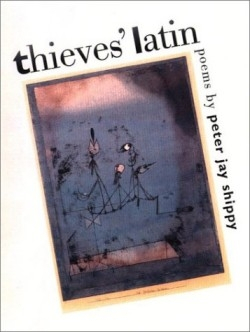Thieves' Latin
The connection between quantum physics, porn-watching canines, and modern art resides solely in the contortionist mind of this poet. In this first collection, readers will find themselves gazing out the window at “a neighbor / at tai chi, posing like a Giacometti,” or inside an art installation. The book resists a glossing, choosing instead the playful, near-miss classifications given to post-modern poets. Without a doubt, the book is intelligent, its references eclectic and broad-reaching, quelling any notion that each poem is not absolutely deliberate and aware of its own games.
Shippy, a graduate of the University of Iowa Writer’s Workshop, won the 2002 Iowa Poetry Prize with this collection, in which linguistic surprise defines at least one tenet of the author’s poetics. In “Not the Kind of Poem Found in the Japanese Edition of Tiger Beat or the Ballad of the Bodiless Man,” Shippy mixes metaphors and allusions to create a new sense of the words and the schema associated with them, writing: “I’ve really come / to really love / Gene Atari / and his joystick / Trigger.” Once readers discover the fun of decoding, they will become like Hirschfeld lovers, looking for Ninas in every poem. In some ways, Shippy even toys with the notion that science, art, and poetry are in no way separate undertakings, suggesting in “Walking with Planck” that the imaginative force behind quantum physics is the same primary mover of the writer’s imagination.
Although many poems are allusive, some simply require a healthy suspension of disbelief as in “Me My Dog and Our Pornography:” “We are under / our Amish divan View-Mastering // The 120 Days of Sodom while / whistling hardcore gabba and / breakbeat techno versions of // ‘The Internationale.’” To demand sense of the poem initially will result in losing one of the primary pleasures of this book-submitting to getting lost and the happy muddle of finding a way back to meaning, even if it is fractured.
Still, Shippy’s vision is something more profound than play; it stakes out the spaces between sense and chaos, illuminating the little places where technology, history, faith, and the mundane brush up against each other. Not for the die-hard advocates of immediate meaning gratification, the book creates a kind of energy-a little unnerving, a little weird-but the poems are so close to the point of being comprehensible that readers will willingly make the charge back into the poems to try to reconnect the synapses of Shippy’s decidedly educated and unpredictable brain.
Reviewed by
Camille-Yvette Welsch
Disclosure: This article is not an endorsement, but a review. The publisher of this book provided free copies of the book to have their book reviewed by a professional reviewer. No fee was paid by the publisher for this review. Foreword Reviews only recommends books that we love. Foreword Magazine, Inc. is disclosing this in accordance with the Federal Trade Commission’s 16 CFR, Part 255.

